![]()
I am the rage I am the storm
My path I leave barren and shorn
Swaying in my crazy dance
I rejoice at all I face
Move at my own pace
I grapple my foe
I wrestle to die
I am the warrior, head held high*
He was a dreamer, a rebel, a lover, a poet. He moved strong men to tears and woke a nation to unite against tyranny. The British imprisoned him only to find his pen spewing venom from the prison cell. Yet, Kazi Nazrul Islam was a romantic, and his lilting songs, magical stories and even his fiery verse did more to bring together Muslims and Hindus than any peacemaker had ever done. The poor turned away from God?s door, the lover spurned, the weak, the meek, the downtrodden, all found refuge in his words and his music. Unlike the literary giant of the time – Tagore, Nazrul was uncompromising. He spoke of strife, and the peace of acquiescence was never his mettle. Mixing Persian, English and Hindi with his majestic repertoire in his native language Bangla, Nazrul called a nation to war against its occupiers, but also spoke out against the tyranny of religion and class. It was his haunting love songs however, that made Nazrul inimitable. Living the life he preached, he refused to conform. Marrying outside religion, shunning material comfort, and eventually rejecting our carefully defined sanity, he rebelled against a peace that required the acceptance of the status quo. Conflict was his muse.
Lalon, long before him, had traversed a very different terrain. The journey between the body and the soul. The metaphors of the bird and the cage, with the soul flirting with the body, elusive. tantalizing and ever so ephemeral. The sufi saint dealt with the conflict between the material world and the spiritual realm. But for Bangladeshis it wasn?t Tagore or Lalon or even Nazrul, but the struggle for language itself that galvanized the nation. Separated from India on the basis of religion when the British were forced to leave, East Pakistanis had always felt exploited by the West wing and discontent had been brewing, but it was when Jinnah declared that Urdu would be the national language of Pakistan that people took to the streets. The violent birth of Bangladesh, gave a nation with its own language, but Bangali nationalism too became the oppressor of other cultures and the indigenous people of the Hill Tracts have been brutally reminded ever since that they are the other. Their peace could only be earned at the cost of their identity.
Surendra Lal Dewan, was sad that his song had been stolen by the president, but that was not what pained him most. As director of the Tribal Centre in Rangamati, he was required to bring out Pahari women dressed in ethnic garb at regular intervals. They would dance in bright tribal costumes for tourists, visiting dignitaries and even curious Bangalis whenever the state needed to demonstrate Bangladesh?s tolerance and its ethnic diversity. In his song Dewan had spoken of a Bangladesh free of oppression and torture. That a military general, claiming the song to be his own, would use the same words to chant of an egalitarian Bangladesh pierced Surendra with his own words.
Even the naked halogen lamp that shone on the creaky planks that made up the stage near Ispahani Gate 1 had gone. It was the port town of Chittagong and there was no electricity. It didn?t affect Mustafa Kamal and the UTSA theatre group. A string of candles lit up the actors. The children came up close. Kamal wasn?t involved in national issues. He and his group performed to children and their parents, in the slums around Gate 1, and in many other parts of the country. The plays would talk of HIV/AIDS, dowry and land rights. The team would go out to villages and settle land disputes, or fights over someone?s loss of face, by getting the villagers to enact their strife in public. Their participatory plays used humour, love and the occasional risqu? dialogue to enthrall a rapt audience who found a momentary outlet from their tortured lives. But the plays were not simply about temporary relief. They introduced strategies for dealing with the tensions that built up between the landed and the landless, between the buyer and the seller, but also between friends, relatives and neighours. Kamal understood that conflict was a natural product of relationships. While controversies and grievances resulting from differences in values, competition for resources, or perceived threats, often result in conflict, its mitigation rarely depends entirely upon the solution of the problem, but might only require a release through rituals of protest.
Artificial barriers between nations, illegal occupation of lands, the struggle between the worker and the employer, the exploitation of women and children, and the suppression of minorities generate sparks that might set ablaze communities, and the fires needed to be doused. But there was more to art than being the key to the cage. Kamal worried that while his art might allay the tension, it might, through appeasement – like the empty rhetoric of politicians, like the opium fed to the hungry child, like the comfort assured in afterlife, like the promises of peace by generals – help perpetuate the greater wrong.
Shahidul Alam
Los Angeles
24th May 2007
* Translated and adapted from the poem ?The Rebel? by Kazi Nazrul Islam
Abridged from an essay written for the Prince Claus Fund for the 2007 Award Book on the theme ?Culture and Conflict?.
Kazi Nazrul Islam (b. May 25, 1899 ? d. August 29, 1976 ) was a Bengali poet, musician, revolutionary and philosopher who is best known for pioneering works of Bengali poetry. He is popularly known as the Bidrohi Kobi ? Rebel Poet ? as many of his works showcase an intense rebellion against oppression of humans through slavery, hatred and tradition. He is officially recognised as the national poet of Bangladesh and commemorated in India.
The birth date of Kazi Nazrul Islam, originally recorded on the basis of the Bangla calendar, is considered by some to be the 24th May 1899.
Category: Human rights
The Trojan Horse
Standing in the grand parliament building in Karachi, built by his grandfather, veteran Pakistani MP Qamar Zaman reflected on the irony of it all. He had long campaigned against the militarization in Pakistan, but recent developments in Bangladesh worried Zaman. ?They saw what went wrong in the Pakistani experiment and decided to fine tune it? he lamented. The election commissioner in India, SY Quraishi, repeated the sentiment. Bangladesh following in Pakistan?s footsteps was not something he welcomed. Kunda Dixit, in Kathmandu, talked of how the same blueprint was being used in all our countries. Despite the rhetoric of democracy, the militarization of South Asian countries was the flavour of the day. Aided by chaotic situations created by political mismanagement, the anti-corruption Trojan Horse brought in its deadly military content.
As in Troy, the people had welcomed them with open arms. Years of mismanagement and corruption had worn down their patience. People wanted respite, regardless of where it came from. This was just the window the military needed. Not wanting to lose out on the lucrative UN placements, they needed a mask. The ?neutral? caretaker government was the perfect foil. The arrests of corrupt politicians, businesspeople and godfathers provided a much needed relief. Few worried about the flimsy, and sometimes concocted accusations used to reel them in. None dared to speak of the glaring omissions. Curbing media freedom took care of the main obstacle. The military or the Jamaat were strangely absent from the list. Amongst the largest and most controversial deals made during previous regimes were the MIG and the Frigate purchases. Yet neither had featured in the cases being investigated. ?kaker mangsho kak khai na.? (A crow doesn?t eat crow?s meat).
After much foot dragging, and over two months of delay, a one member body was asked to probe into the death of adivasi activist Choles Ritchil in the most gruesome killing while in military custody. The Shadarghat launch disaster, in contrast, had three separate investigation committees ordered to submit reports within 24 hours. Choles on the other hand had resisted a multimillion dollar deal to take over adivasi land. It was a different ball game.
Tasneem Khalil was one voice that they had not been able to silence. His incisive, well researched investigations flew against the culture of silence that prevailed. Mahfuz Anam, the editor of the leading English daily, The Daily Star, had proudly told me, ?In all these years, not a single story had been spiked.? That was some time ago. Things were different now. The story of military involvement that Tasneem had revealed was pulled back from the press in the last minute. A commentator on the roundtable at Drik on the 3rd May, International Press Freedom Day, had equated the Daily Star and the Daily Prothom Alo with a new political party. The newspapers had elaborate reporting on the US ambassador’s love for democracy and a free press. The Drik roundtable, featuring some of the bravest journalists working in the land, went unreported. The roundtable had discussed the military, the corporate deals taking place, the heavy hand of foreign countries. It talked of deals being pushed through in the absence of dissent. Tasneem had deliberately not been asked to speak. That would be inviting trouble.
That didn?t protect Tasneem for long. In my room in Shangri La Hotel in the early hours of this morning I received an SMS from a student. Tasneem had been picked up from his home. This is a risk that all journalists speaking against the?government are prepared to take, but given what Choles Ritchil went through, this arrest is more ominous. A suicide note for an epitaph is too likely an outcome to let the system take its course.
Shahidul Alam
Kathmandu
11th May 2007
From SAJA list:
Daily Star reporter (formerly with New Age), and CNN Dhaka stringer, Tasneem Khalil was
picked up by men in plain clothes @ midnight, claiming to be from
“Joint Forces”/Army.
Tasneem Khalil Picked Up By “Joint Forces”
CNN Reporter Picked Up
Tasneem’s Blog
Tasneem, We’ll Come Get You
http://salamdhaka.blogspot.com/
Human Rights Watch Issues Alert
Tasneem on Choles Ritchil Case
Tasneem on Modhupur
Tasneem quoted in Washington Post
Sabash Bangladesh!
Searching for solutions
![]()
It was 1985, when Jun Jun and I came over for our first trip to Nepal. I had nearly died of hypothermia in our trip to the Everest Base Camp, and Jun and a Japanese explorer had saved my life. My subsequent trips to Nepal have been marked by other drama. As I left for the airport yesterday, Navaraj, the tutor at Pathshala from Kathmandu reminded me that I was going to a new Nepal, one no longer under the rule of the king. Sapna, the human rights lawyer we interviewed in Kathmandu today, remarked wryly, that it was a Nepal ruled by many kings. With the Moaists now in government, one hopes that at the least the violence will go down. Too many lives have been lost.
The killings and disappearances in Nandigram in the largest democracy in the world, and the recent killing of the Adivashi Garo activist Choles Ritchil in the most brutal manner imaginable – ?Choles?s two eyes plucked, testicles removed, anus mutilated, two hand palms smashed , nails of 3 fingers of the right hand removed, left hand thump finger nail removed, two palms had holes, upper right hand had severe wound, several blood stains on the back part of the body, in both thighs middle part there had been two holes, back part of the body had several black marks, several deep marks of wounds on both lower legs, there had been black marks on feet, no nail on thump of right foot, all fingers of two hands were broken.? – by the much lauded new regime in Bangladesh are worrying signs. With conventional media under threat, bloggers become the lonely and marked whistle blowers.
Majority world photographer and All Roads winner from Guatemala Sandra Sebastian is one of many activists in search for solutions.

I couldn?t believe that passers-by weren?t killed when a shooting occurred between drug traffickers on a busy day in one of the principal avenues in Guatemala City. Two presumed drug traffickers were murdered in their car, which had lots of AK-47 bullet-holes. There were hundreds of bullet-holes all around the avenue. The walls of a school and a bus stop where many people usually sat, were also riddled. Unfortunately two men died, but it could have been a massacre. How many people have to be killed before something is done?
I wasn?t the only astonished person. I took the picture because I want to document and leave a testimony of the time I live in and show the danger that ordinary people face. In the last year alone (2005) more than 5,000 people were killed in street violence in a country of 13 million people. The reasons? Delinquency, organized crime, drug trafficking, poverty, broken homes. I want to talk of the inefficient justice system and the impunity with which some operate. I want to point to the consequences, and hope people can understand and search for solutions.
1971 as I saw it
![]()
Thirty five year ago, even longer perhaps, just a camera in hand, they had gone out to bring back a fragment of living history. Today, those photographs join them in protest. Peering through the crisp pages of the newly printed history books, they remind us, “No, that wasn’t the way it was. I know. I bear witness.”
The black and white 120 negatives, carefully wrapped in flimsy polythene, stashed away in a damp gamcha, have almost faded. The emulsion eaten away by fungus, scratched a hundred times in their tortuous journey, yellowed with age, they bear little resemblance to the shiny negatives in the modern archives of big name agencies. They too are war weary, bloodied in battle.
So many have sweet talked these negatives away. The government, the intellectuals, the publishers, so many. Some never came back. No one offered a sheet of black and white paper in return. Few gave credits. The ones who risked their lives to preserve the memories of our language movement, have never been remembered in the awards given that day.
35 years ago, they fought for freedom. They didn’t all carry guns, some made bread, some gave shelter, some took photographs.
(c) Abdul Hamid Raihan
Abdul Hamid Raihan is one such photographer. A.S.M. Rezaur Rahman came upon him through a small interview on television. Unlike many other photographers, Raihan had preserved his negatives. And unlike many researchers, Reza had doggedly pursued. The exhibition, “1971, as I saw it” is not a record of momentous events, but a rare glimpse of what everyday people might have witnessed under occupation and through victory. press-release-english-bangla.doc
——
Autograph ABP presents: The John La Rose Talk Series
Documentary Photography & Social Change: Mark Sealy in conversation with Lyndall Stein and Shahidul Alam at Amnesty International UK
Amnesty International UK
The Human Rights Action Centre
17 – 25 New Inn Yard
London EC2A 3EA
6.30pm – 8.00pm 29th March 2007, Phone +44(0)20 7033 1500, Nearest Tube: Old Street, Moorgate & Liverpool Street
In an age where our daily lives have been saturated by images of globalization there has been a revolt by NGOs and arts organisations who are beginning to forge links and alliances to explore new ways of using visual culture to discuss issues that address a human rights agenda in the 21st century. It is in this context that Mark Sealy the Director of Autograph ABP will explore a conversation that looks specifically at the role photography has played in helping to bring global human rights issues to a wider constituency.
A student screams out to friends from a police van at Jagannath Hall, Dhaka University, after a police raid. 31 January 1996. (c) Shahidul Alam/Drik
—-
Meanwhile Bangladeshi photographers shine at the 3rd China International Press Photo (CHIPP) Contest held in Shanghai from March 21 to 25, 2007


Former Pathshala student Munem Wasif, now working with www.driknews.com wins the bronze prize in the Daily Life category with a powerful piece showing modern forms of slavery, through his story on the workers in the tea gardens of Bangladesh.
Former student of Pathshala and University of Bolton and currently tutor of Pathshala – Andrew Biraj – wins the bronze prize in the Topical News category with his timely piece about the attempts by multinational companies to take over land of indigenous communities,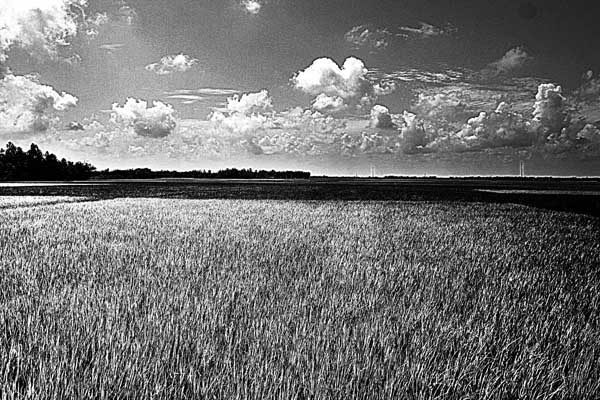



while photographer Shafiqul Islam wins an honourable mention in the same category for his piece on police brutality against women. Biraj and Shafiq are both contributing photographers of DrikNews.

Meanwhile on it’s independence day, Bangladesh moves towards the final eight in the ICC World Cup! However, while we celebrate these wins and the recent arrests of godfathers and the ongoing cleaning up operations, the new laws curbing public freedom continues to worry. The death of Garo activist Cholesh Ritchil (http://www.drishtipat.org/blog/2007/03/19/urgent-modhupur-eco-park-activist-killed-2/) in the hands of ‘Joint Forces’ makes us fearful of the consequences of absolute power.
From Dili to Delhi
![]()
I had just left behind a tense East Timor. No rice for several weeks? violence had again erupted on the streets. I had expected my one day pit stop in Dhaka, on my way to a UNAIDS assignment in India, to have been less eventful. Dili to Delhi had a nice ring to it. The plane had arrived in the early hours of the morning, and as I sat at Drik trying to finish the million pending bits that invariably pile up, Rahnuma rang to talk of the fire. Soon we were up there, outside the familiar building where I?d recently given interviews. Through the billowing smoke, my NTV and RTV mugs reminded me of how close our lives constantly were to needless tragedies shaped by irresponsible gatekeepers. I wondered whether the new gatekeepers in power, ushered in by an unspoken coup, would be different. They had started well, arresting corrupt individuals, and attempting to establish the rule of law, but the sinister rumblings of indefinite stay, had all the signals of previous regimes while the significant omissions in their ?hit list? was deeply worrying. On the plane Farhad Mazhar and I talked of having to brace ourselves for new measures designed to make us more safe. As for the disproportionate influence of ?friendly nations?, swapping freedom for security appeared to be the order of the day. I wish we had a choice on whom to befriend.
Naeem?s translation of Anisul Haque?s moving Op Ed, and Peu?s mail pointing to Munir?s powerful images,
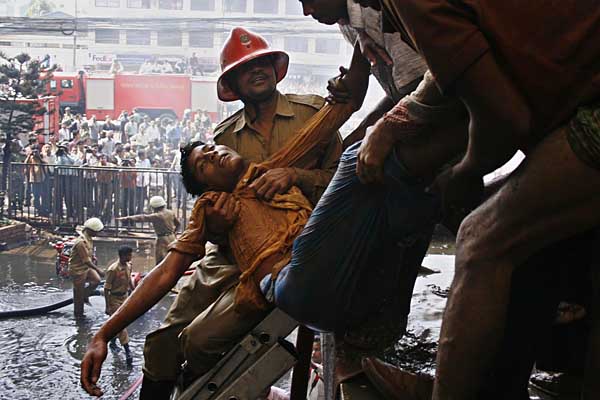
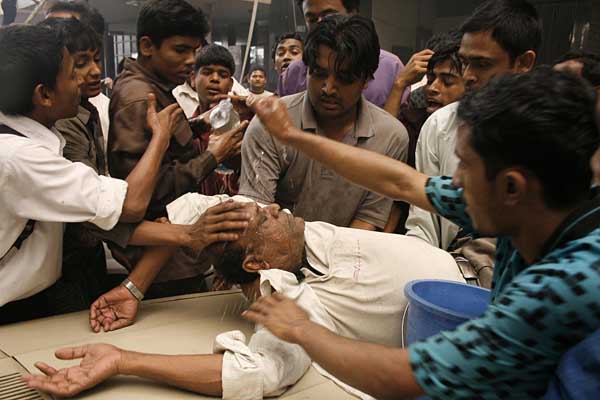
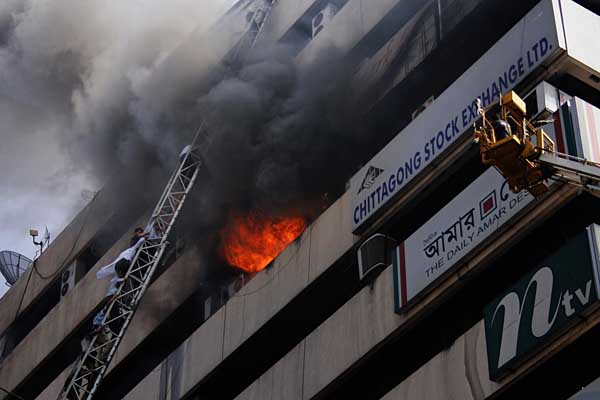
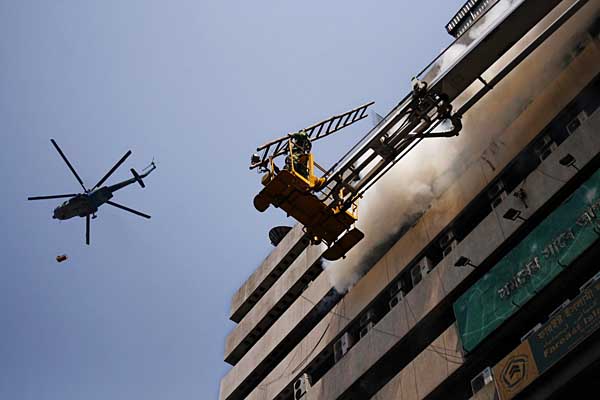
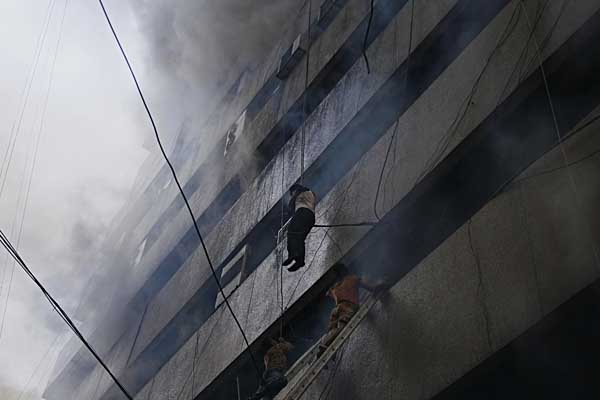
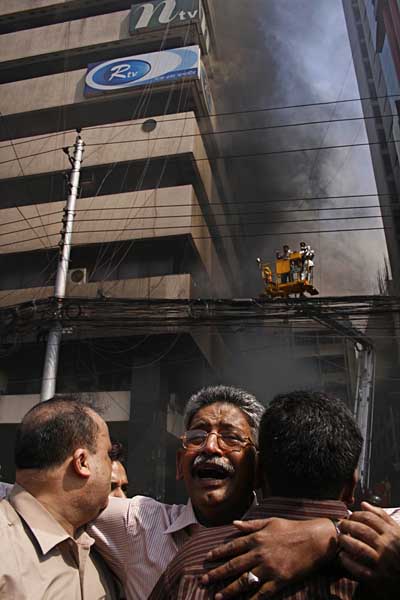 Photographs copyright Munir uz Zaman/Driknews. (Permission for use and high resolution images available from www.driknews.com).
Photographs copyright Munir uz Zaman/Driknews. (Permission for use and high resolution images available from www.driknews.com).
bring home a message too often forgotten. As Shupon points out, we forget very easily. As we?ve forgotten the deaths in the garment factories, or the ferry disasters. But then, those had involved the death of poor people.
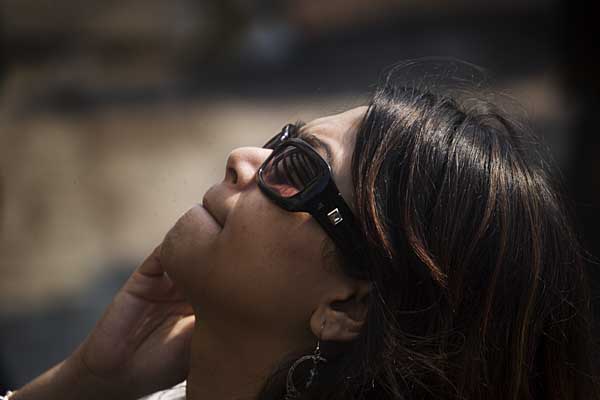 copyright: Shahidul Alam/Drik
copyright: Shahidul Alam/Drik
The near death of the well to do could perhaps have a more lasting memory.
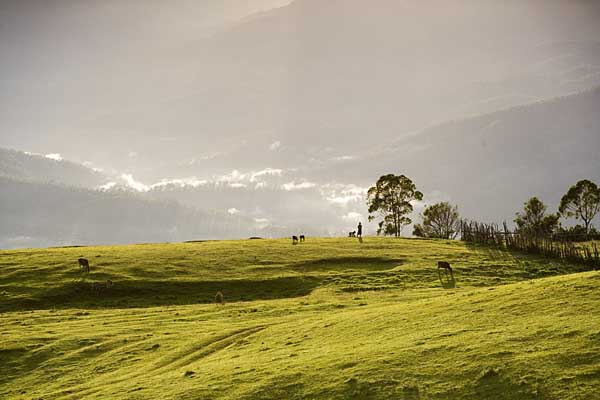 copyright: Shahidul Alam/Drik
copyright: Shahidul Alam/Drik
The tranquil mornings in the mountains of East Timor seemed a long way away.
Shahidul Alam
Delhi
27th February 2007
I can kill any Muslim
![]()
Year end play: The Nuculier God
Theatre: The World
Set Design: Tony Blair
God: George Bush
Sacrificial Lamb: Saddam Hussein
Slaves: Saudi Royal Family and cohorts
Extras: The United Nations
Theme song: I can kill any Muslim
I can kill any Muslim
Any day I choose
It?s all for the cause of freedom
I can kill any Muslim
Wherever I choose
It is cause we?re a peace lovin? nation
So we egged him on
When he attacked Kuwait
And the trial may have been harried
So we supplied him arms
To gas the Kurds
With him dead, that?s one story buried
Violence in Iraq
Has been on the rise
The US can hardly be blamed
Our interest was oil
And we stuck to our goal
Why must my cronies be named
Saddam?s emergence
As Arab resistance
That wasn?t part of the plan
Had Amnesty and others
Kept quiet when it matters
We?d have quietly gone on to Iran
Asleep I was
When he hanged on the gallows
Well even presidents need to sleep
Oblivious I was
When the planes hit the towers
I had other ?pointments to keep
More Iraqis dead
More ?mericans too
OK they warned it would happen
Why should I listen
When I rule the world
No nation?s too big to flatten
The Saudi Kings
They know their place
At least they?ll know by now
Muslim?s OK
If you tow the line
Out of step, off you go, and how
Tony and me
We keep good company
Dictators know when it matters
Regardless of crimes
And religious inclines
Safe if you listen or its shutters
I can kill any Muslim
Wherever I choose
I choose quite often I know
I can kill any Muslim
Any day I choose
I did it so now they will know
Similar to Rumsfeld’s concern that the Abu Ghraib pictures coming out, and not about the events themselves, the Iraqi government worries about the footage of Saddam being taunted, getting out. The fact that the taunting took place doesn’t appear to be an area of concern. With the US government stifling Al Jazeera, and increasing censorship in mainstream media, citizen journalism appears to be the only way people can get past the PR camouflague.
With all political parties of Bangladesh, as well as most Muslim leaders around the world, choosing to remain silent at the execution of Saddam Hussein, it is left to human rights organizations to remind us, that despite his atrocities, Saddam will be remembered for his defiance. The butcher of the Kurds will go down in history as a victim of flawed justice. The guns are now clearly turned against Iran, but the Saudi rulers, as well as the Egyptians and the Jordanians would do well to ponder, ?Who is next??
Reselling Your Soul to the Devil
![]()

20th anniversary of Ain O Salish Kendra and National Museum auditorium, Dhaka. Bangladesh

Fazle Hasan Abed (left), Muhammad Yunus (centre) and George Soros (right)
Muhammad Yunus, Amartya Sen, Fazle Hasan Abed, George Soros Sultana Kamal. I could hardly have asked for a better photo op. Well it is Christmas! If ever a nation was in need of a pick me up, this was it. The twentieth anniversary of Ain O Shalish Kendra (ASK) had a special significance. This was an organization that has been relentlessly fighting for the rights of the downtrodden. Despite the central bank predicting a 7 percent growth in the coming year, with both parties poised to contest the upcoming election choosing to woo the autocratic general the people had fought to overthrow, and the traditionally secular Awami League (AL) selling out to the Bangladesh Khelafat Majlish (BKM) for supposed electoral gains, the people needed the assurance that at least some still believed in a secular state and the interests of common people.

Amartya Sen lauded ASK and women?s agencies for the role they had played in upholding the rights of women and talked of the importance of freedom of speech.

Muhammad Yunus reminded the audience of ASK?s role in preserving the legal rights of the poor. Both Nobel laureates stayed clear of commenting on the decision that had been made by the major opposition party, which had just buried all of these ideas for political convenience.

Sen gave an eloquent speech, weaving history and his own characteristic economic analysis to point to the role civil society could play in creating a more egalitarian world.

His witty anecdotes about Salma Sobhan, the diminutive but feisty human rights activist who had founded ASK, and his frank accounts of the attempts by him and his friend, our own celebrated economist Rehman Sobhan, in winning over Salma Banu, before she became Salma Sobhan, was a warm and sincere tribute to one of Bangladesh?s finest citizens. But despite the joy of celebration, the mood in the audience was less than ebullient. The high court ban on fatwas had been a hard won battle and the gloom caused by AL?s entente with the other side of the fundamentalist coin, had left everyone shattered. My activist friends were surprisingly unperturbed. ?Well, they have unmasked themselves? said Khushi Kabir, ?it is time we woke up to what the parties really represent.?

Sultana Kamal was similarly defiant but also brought up her concerns. ?It has always been our fight, and now we know what alliances to avoid. But they have effectively robbed me of my voting rights. If I now want someone in parliament to stand up for the rights of women, or the Ahmadiyyas, or for free speech, whom do I turn to? The candidates too have no choice. The few who might have wanted to enter the fray because they wanted to change things, now have no party to turn to.?
Politicians are not known for honesty and candour. AL?s win at any cost deal was defended by Abdul Jalil, the general secretary of AL who signed the document, as he tried to wriggle his way out of the hole he had dug himself into. ?It is an understanding based on an election strategy? and ?any decision is a fatwa? he rambled.
This particular election strategy seems to have left out the voters from the equation. The latest ?fatwa? by the Awami League is a ?decision? that will haunt them.
The Month of Victory
![]()

14th December 1971. The stark dismembered face stared from the bricks in the Rayerbazar graveyard. It was a last ditch attempt by an occupation army to leave a nation they had been unable to subdue, crippled intellectually and culturally. Rashid Talukder’s iconic image was one of numerous outstanding photographs taken by Bangladesh’s best known photojournalist. The lifetime achievement award given to him was long overdue. Rashid Bhai joins other Bangladeshi photographers featured in the Festival of Photography in Asia Chobi Mela IV, whose images grace the much awaited Drik Calendar 2007.
Meanwhile a self appointed head of caretaker government chooses the month of our victory, to call in the military against the wishes of his own cabinet. Kudos to the caretaker advisers who chose to resign rather than going against the interests of the nation. Where ministers have shamelessly stayed on despite blatant exposures of corruption and malpractice, it is a rare example of self-respect.
The Drik calendar 2007 is in the press and is out next week when it will also be available on our website: http://www.drik.net/html/calendar.htm and in our online shopping mall: http://kiosk.mdlf.org/estore/publisher?id=21

Autumn was unkind, rude and remorseful
Spring become unmerciful, rude and murderous
Butterflies don?t die, they don?t live either
Photo: Momena Jalil

Dried Kash flowers at the bank of the Old Brahmaputra. “When I had my legs I could cross the river in one go.” Rajib. Bangladesh/Photo: Saiful Huq Omi.
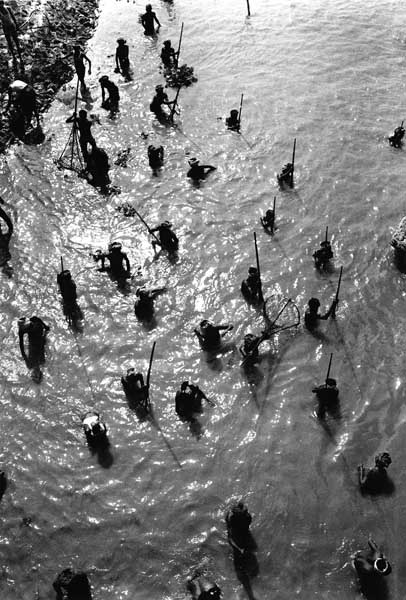
People fishing in a group using traditional techniques. The fishing usually takes place in the dry winter season. Wetlands of Bangladesh/Photo:Rashid Talukder.
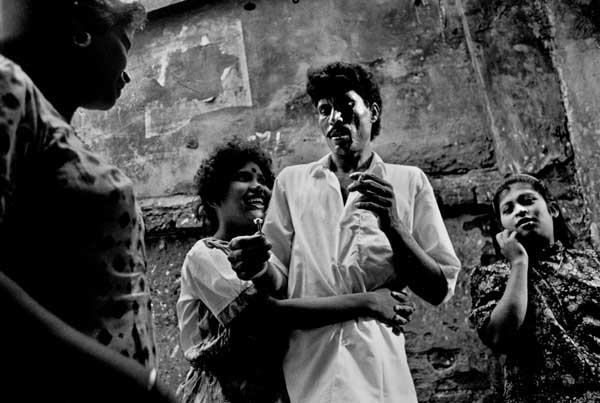
Enticing a prospective client. With roughly 25 customers needed for daily upkeep, competition is intense. Kandupatti brothel, Dhaka. Bangladesh/Photo: Shehzad Noorani.

Every morning After Fazr, Keramat Ali sat here. His work ended at around 10 pm. After 22 years of service, he went back to his home town and his family. No pension and no savings/Photo: Syed Mahfuz Ali
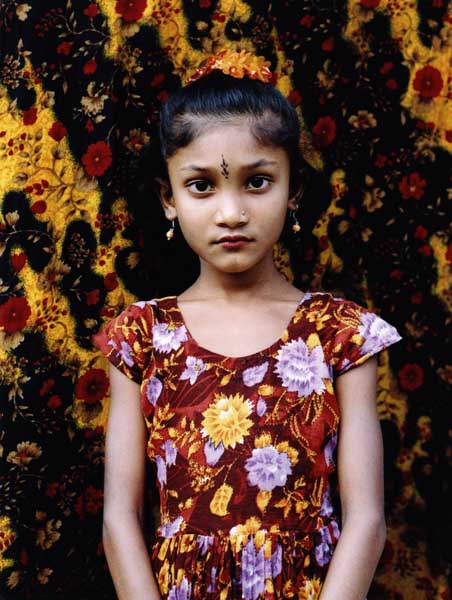
?Mama, take my picture,? my niece Pinki asked me. It was already nearing dusk. I held my breath with the aperture open just enough, and pressed the shutter/Photo: Sheikh Motiar Rahman

Sheep head for shelter at the onset of a storm in the Himalayan range in the Yarlung Valley. Eastern Tibet. China/Photo: Shahidul Alam

She migrated from the Northern district to Dhaka for livelihood. As a sand worker at Gabtoli, she works dawn to dusk for seventy taka. Bangladesh/Photo: Partha Prathim Sadhu

Men saw a large tree trunk in the naked afternoon sun. They don?t pick leaves in the gardens. Kapai Garden, Lashkarpur Tea Estate. Bangladesh/Photo: Munem Wasif

Traders import cows from India prior to the Muslim festival Eid Ul Azha. A cow falls in the water while being unloaded from a boat. Aricha. Bangladesh/Photo: Abir Abdullah

?These are the shacks we live in ? we call them ?Tali? ? there are 1873 families living here at this moment.? Rohinga refugees from Myanmar. Teknaf. Bangladesh/Photo: Mahbub Alam Khan

This is a Road I have been seeing for ages, while I have been happy, sad, upset, romantic, high, low & while growing up. It fills me with memories. They call it the VIP Road/Photo: Gazi Nafis Ahmed (Adnan)
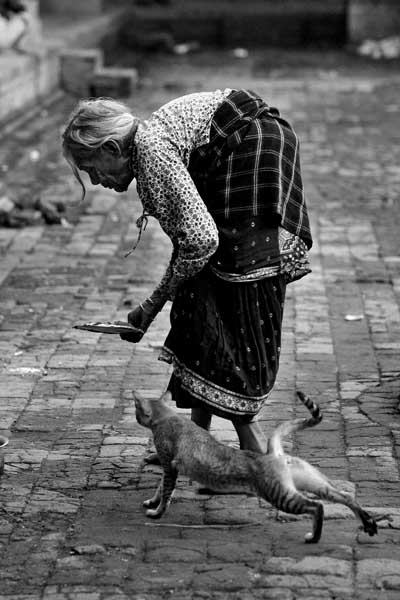
Dipa Thapa, 75, has two pet cats in Pashupati Bridhashram (an Old People?s Home). They are her only friends. Nepal/Shehab Uddin
In the countdown to the election the newly launched DrikNews, promises to challenge the stranglehold of western agencies AP, AFP and Reuters. www.driknews.com is the site to watch.
14th December 2006. Amsterdam
Judge on the docks
![]()

?Come out we won’t shoot?, they had yelled out over the megaphone. Not the most alluring of invitations, particularly when it is from a police van surrounding your flat at midnight. They had thought we were hiding someone and after searching our rooftop had come into our flat. As they left, I had gone out to take pictures from our verandah. Rahnuma had turned up the television volume to hide the sound of the shutter on my Nikon 501, but it still seemed to make a very loud click. Luckily, I wasn?t noticed. It was the 2nd December 1990. Ershad?s autocratic government was feeling the heat. 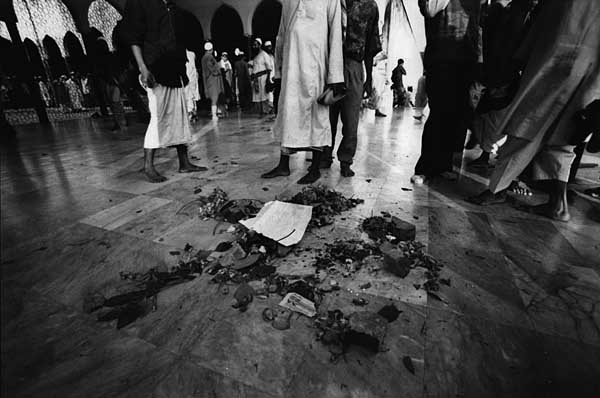
Two days earlier, after the Friday prayers, they had opened fire on the Baitul Mukarram mosque killing a man.
Lawyers had played an important role in our democracy movement. They had upheld writ petitions against the government, and when the government tried to flex its muscles, they came out in protest, united in their stand.

On this day, exactly sixteen years ago, barrister Shahjahan, Sarah Hossain and other lawyers were meant to meet at Drik. We were monitoring the government action, and were ourselves under scrutiny. My colleagues had warned me that plain clothed detectives were looking for me at the office. The detectives seemed to know we lived in Lalmatia, and my colleagues suggested that we stay elsewhere that night. Ma (Rahnuma?s mum), Rahnuma, Tehmina (a lawyer friend of ours) and I went over to Saif and Rini?s flat in Dhanmondi Rd 8. This was not the time for taking chances. The media too had played their role. When censorship became intolerable, they refused to publish. It was that night that Ershad had announced on television that he was going to step down. People were rejoicing in the streets. The following morning the first newspaper was out.
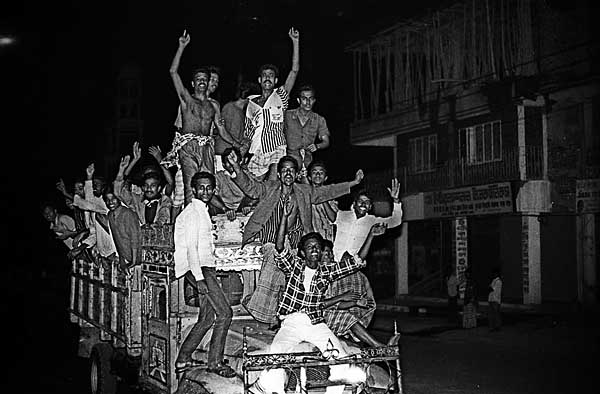

We all went out into the streets. Altaf on his motorbike, me on my bicycle, and the others in whatever transport they could find.

A little girl walked down Mirpur road with a bouquet of flowers in her hand. She too was celebrating the return of democracy. People were dancing in the streets. In Paltan, too often the scene of violence, people gathered in ones and twos.

Men and women in their sleeping clothes, some with children, gathered in the winter night. Chatpati wallas sensing a business opportunity appeared out of the fog. At about 1:30 am Shimul Billa, Bangladesh’s Shirley Temple, sang out ?Bichar poti tomar bichar korbe jara, aj jegeche ei jonota?.

The song ?O judge, the people have risen, it is now the day of your judgement?, was strangely prophetic.
And now in 2006, the chief justice of the supreme court intervenes to prevent a decision
going against a political party, lawyers ransack the court, a president with zero credibility heads a caretaker government, and of all people, Ershad himself is in the streets, demanding the removal of the current president, while Moudud, the chameleon survivor, then Ershad’s right hand man, now holds hands with the chief justice.
4th December 2006
Delhi
Stretching the Deadline
![]()
An extra day! Not unusual in itself, but considering that a deadline had been announced so long ago, it seems a strange thing to ask for. What could happen in that extra day that could not have happened before? This extra day brings fresh violence, and while the advisers give us hope of ‘light at the end of the tunnel’, it is unfortunate that yet more loss of life continues while the politicians do their tap dance. If the Chief Election Commissioner (CEC) is to step down, he should do so soon. The presence of a party appointee as head of state, head of military and head of government is bad enough. An appointee Chief Election Commissioner armed with a rigged voter list simply cannot be the basis of a fair and free election.
If there be a genuine belief in a multiparty system, the process must involve, putting in place a caretaker government with backbone, and accepting a free and fair election regardless of the outcome.
Providing electricity, ensuring wage increase for garment workers, eliminating rampant corruption and ensuring freedom from extortion and ?crossfire? are far better means of ensuring support, than empty rhetoric, paid goons and spineless sycophants in key positions. There is more blood on the streets today. It is time politicians were made accountable.
It was Nasreen’s birthday on the 18th, but though friends gathered in their Dhanmondi home and sang songs, and Jamila stayed her chirpy self, gloom pervaded the air. The article in the Daily Star brought up renewed doubts about corruption, cover-ups and selling out the country.
Pathshala alumni Monirul Alam is on vigil outside President House. The expectation is that the CEC will be bringing his resignation letter. Drik photographer Shehab Uddin is in Nepal following the peace agreement. Perhaps we too can hope for peace.
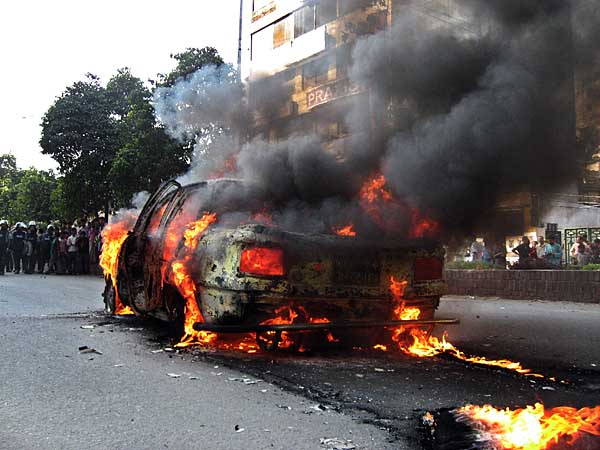
Burning car at Russel Square, close to Pathshala earlier in the afternoon.
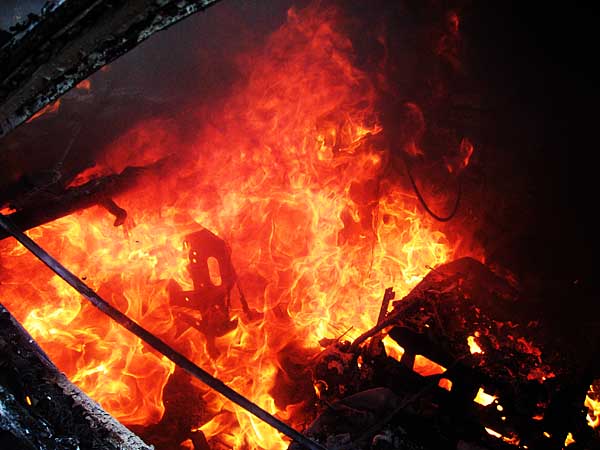
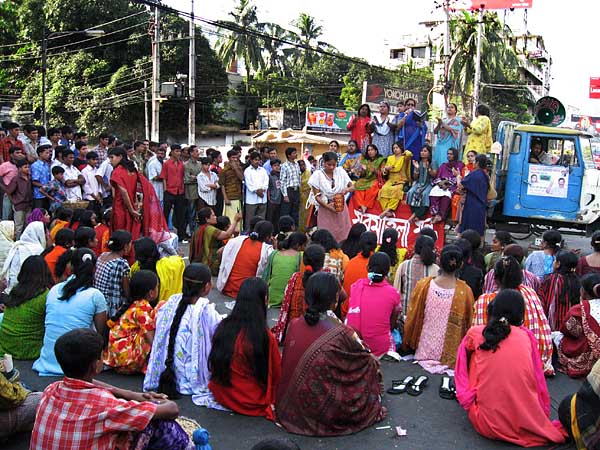
Singing in Mirpur Road
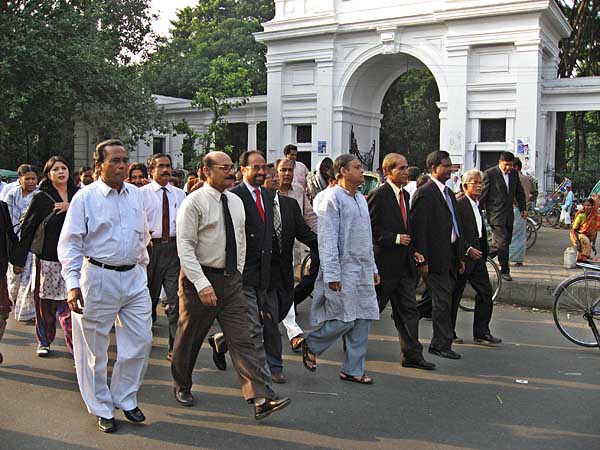
Protesting lawyers coming out of the Supreme Court
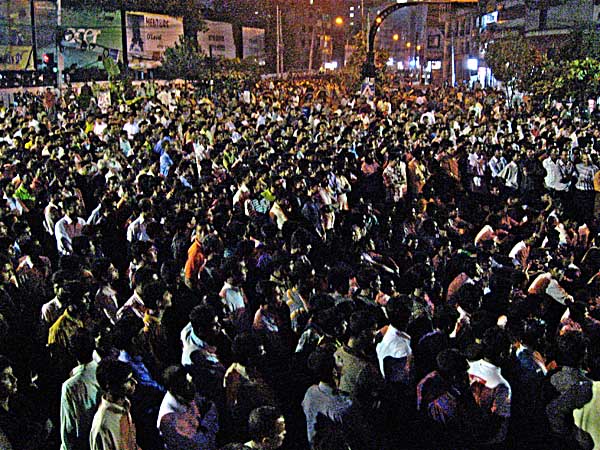
Open air concert at Russel Square last night.
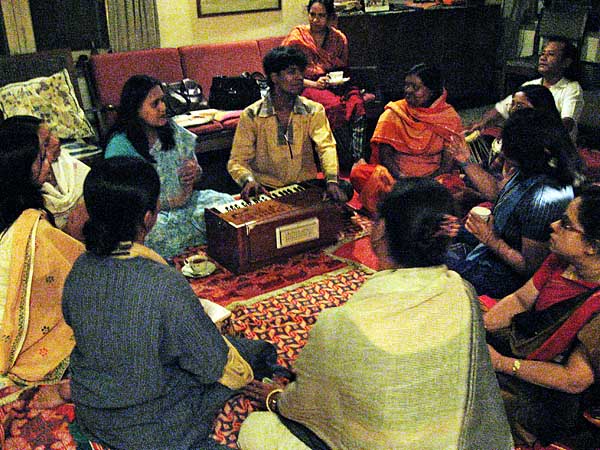
Friends singing on Nasreen’s birthday
Chobi Mela IV continues despite it all. Rashid Talukder opened the splendid exhibition resulting from Morten Krogvold’s workshop, at Shilpakala Academy.
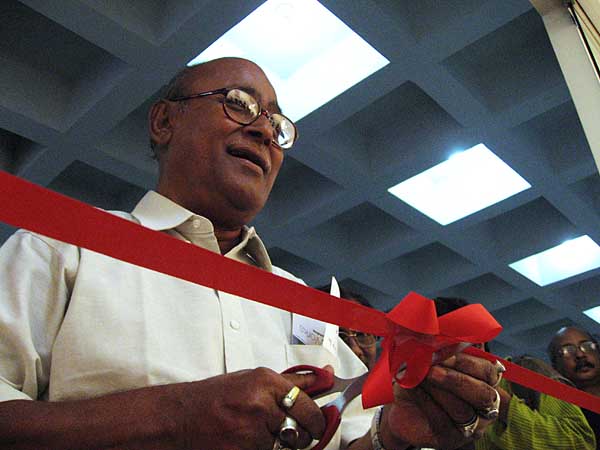
Despite my scraggly beard, Torsten thought I was Father Christmas when I went to drop off the Chobi Mela gift packs at the Goethe Institut, insisting that he teach me the German song that Santa Claus would have sung.
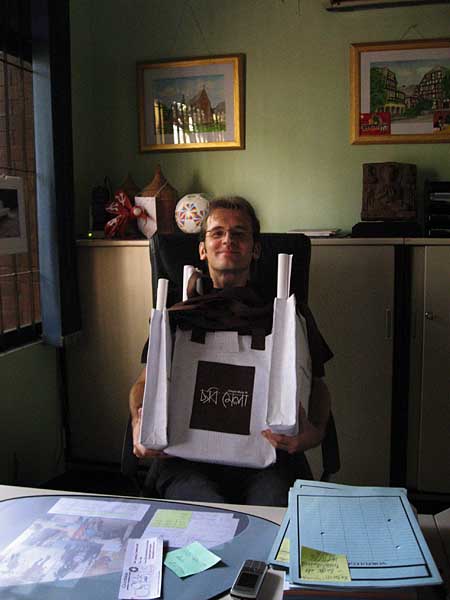
Two and a half years after the opening of the gallery, the airconditioners had still not been installed, but the viewers were not to be deterred, nor were the rag pickers outside Drik, Shanta and her friends, who decided the cool open space of Drik’s new gallery was the best place to try out their break dancing routine.
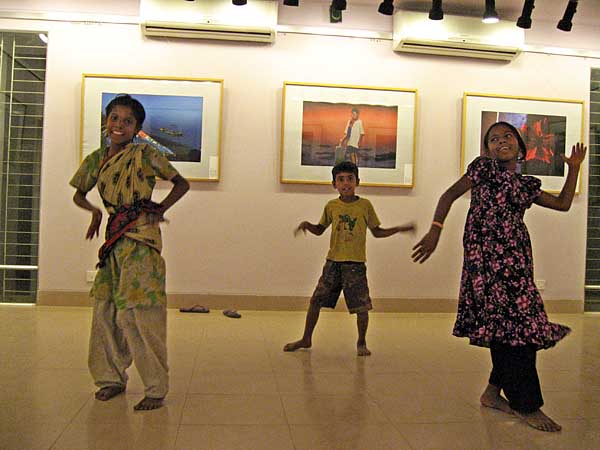
I am sure my pictures on the walls enjoyed their dance. I know I did.
